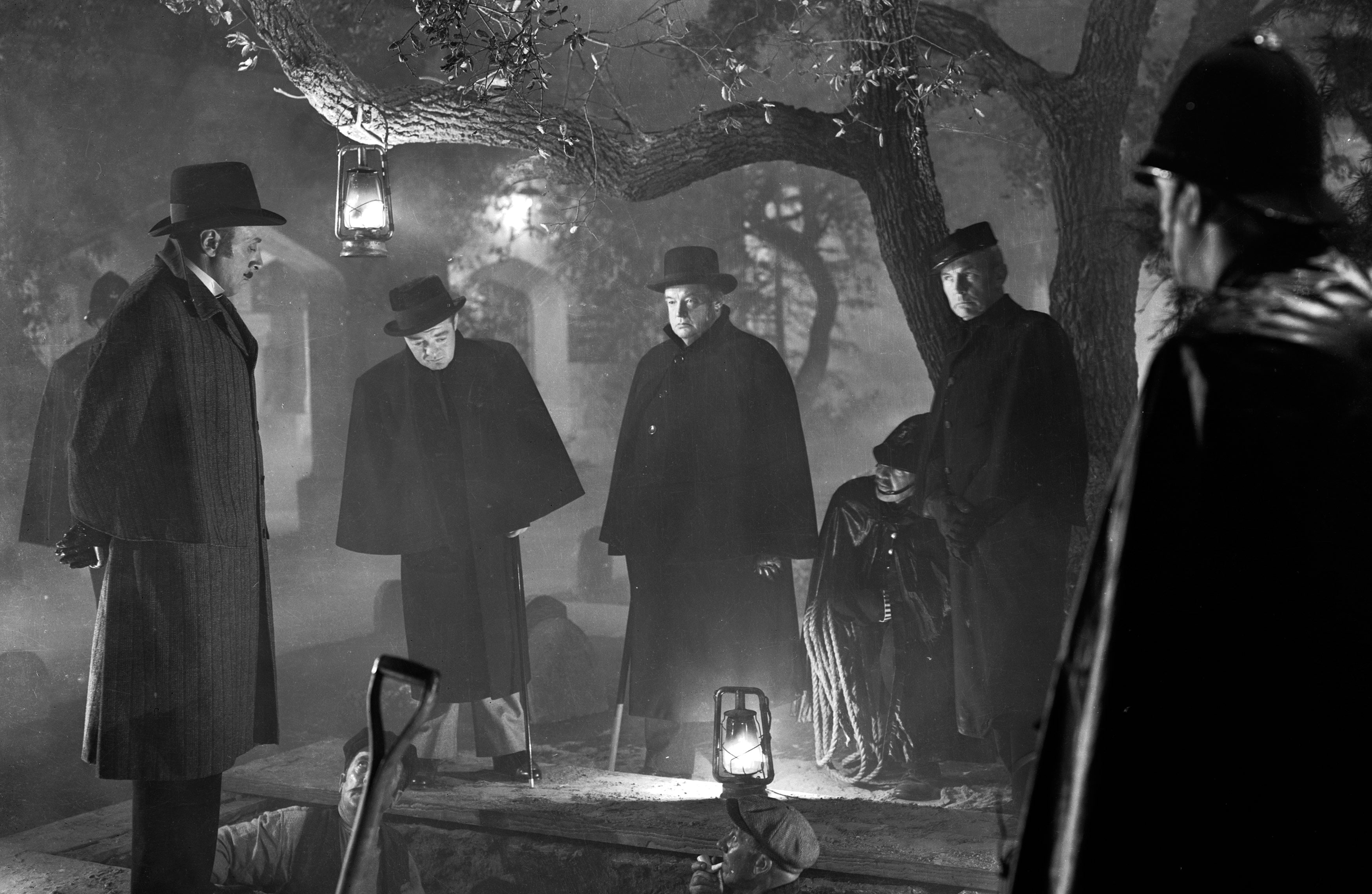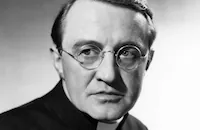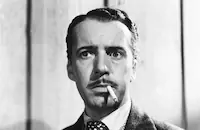The Verdict

Brief Synopsis
Cast & Crew
Don Siegel
Sydney Greenstreet
Peter Lorre
Joan Lorring
George Coulouris
Rosalind Ivan
Film Details
Technical Specs

Synopsis
In London in 1890, after an innocent man is convicted of the murder of Hannah Kendall and hanged, police superintendent George Edward Grodman, whose testimony based on circumstantial evidence helped to convict the man, is forced to resign. Grodman's rival, John R. Buckley, is made superintendent in his place. Later, Grodman's neighbors, Victor Emmric and Arthur Kendall, Hannah's nephew, gather at his house for a small party. When Clive Russell, a member of Parliament, arrives, however, a quarrel over politics breaks out between him and Kendall, and the party ends abruptly. Outside, Russell threatens Kendall and is overheard by Lottie, a music hall performer and Kendall's mistress. After Russell leaves, Lottie accuses Kendall of giving her fake jewels and demands the return of a watch fob she gave him. Kendall puts her off and crosses the street to his rooming house. The next morning, when Mrs. Benson, the landlady, fails to rouse Kendall from his sleep, she begs Grodman to break down the door. Grodman does as she asks and announces that Kendall has been stabbed. Buckley examines the room and ascertains that the windows and doors are locked and bolted. Later, Buckley discovers Lottie searching Kendall's room. When he questions her, she explains that she is looking for Kendall's watch fob. Because the fob is nowhere in the room, a skeptical Buckley arrests Lottie. Grodman then suggests that they check Kendall's grave for the fob, and it is found in his pocket. Later, at the music hall, Lottie tells Victor and Grodman that Kendall knew that Russell was involved with a married woman. When Russell returns home from visiting his constituency, he discovers that his room has been searched. Troubled, he consults with Grodman. Unknown to him, Victor is eavesdropping on their conversation from inside a closet. Russell tells Grodman that he was visiting the woman he loves at the time of the murder, but refuses to name her because she is not yet divorced. Later, Lottie tells Buckley that Kendall knew about Russell's love affair and demands that he arrest him. The circumstantial evidence convinces Buckley that Russell murdered Kendall, and he persuades the jury to find him guilty and sentence him to death. When Russell's final appeal is denied, he finally names Lady Pendleton as his mistress, but she dies in France before Grodman can obtain her testimony. That evening, Grodman writes the last chapter of a book about his famous cases. The next day, at Scotland Yard, Grodman reveals that Kendall killed his aunt, who was intending to write him out of her will. The night before Kendall's death, Grodman, aware that Kendall was the killer, put a sleeping potion in his drink. He then killed Kendall after he knocked down the door, to avenge both Hannah and the innocent man who died for the murder. Grodman adds that he waited until the last minute to confess in order to humiliate Buckley.

Director

Don Siegel
Cast

Sydney Greenstreet

Peter Lorre

Joan Lorring

George Coulouris

Rosalind Ivan

Paul Cavanagh

Arthur Shields
Morton Lowry

Holmes Herbert
Art Foster
Clyde Cook
Janet Murdoch

Ian Wolfe
Paul Scardon
David Thursby
Olaf Hytten
Colin Kenny
Reginald Sheffield
John Goldsworthy
Bing Conley
Colin Campbell
Leo White
Jock Watt
Eric Wilton
John Valentine
Creighton Hale
David Martin Jones
Gerald Oliver Smith
John Power
Milton Parsons
Billy Bletcher
Mark Strong
William H. O'brien
John Romero
Sarah Edwards
Al Ferguson
Henry Mowbray
Harold De Becker
Crauford Kent
Frank Hagney
Alexander Pollard
Arthur Gould-porter
George Kirby
Casey Macgregor
Herbert Evans
Alec Harford

Boyd Irwin
Albert Petit
Marcel De La Brosse
Herbert Clifton
Barry Bernard
Boyd Davis
Arthur Stenning
Ted Jacques
Fernanda Eliscu
Leah Baird
Jimmy Aubrey
Montague Shaw

Harry Cording
Wilson Benge
Betty Fairfax
Crew
G. W. Berntsen
Robert Burks
Russell Collings
Gordon M. Davis
Elmer Decker
Leo F. Forbstein
Charles David Forrest
Ernest Haller
Frederick Hollander
William Jacobs
Felix Jacoves
M. K. Jerome
James Leicester
E. Kenneth Martin
Jack Mcconaghy
William Mcgann
Peter Milne
Don Page
Leonid Raab
Thomas Reilly
C. A. Riggs
Jack Scholl
William Schurr
Ted Smith
Travilla
Jack L. Warner
Perc Westmore
Virginia Yates

Videos
Movie Clip



Hosted Intro
Film Details
Technical Specs

Articles
The Verdict
The Verdict (1946) was the eighth and final film teaming Sydney Greenstreet and Peter Lorre. Greenstreet plays former Scotland Yard superintendent Grodman while Lorre plays Victor Emmric, an artist and friend of Grodman's. The two men formed an unlikely and often eerie duo. Greenstreet was a large man, weighing nearly 300 pounds, and his size contrasted sharply with the much smaller Lorre. They were often cast in mysterious or sinister roles. The first film teaming the odd couple was The Maltese Falcon (1941), which was also Greenstreet's film debut.
The Verdict is the second film to be based on the novel The Big Bow Mystery by Israel Zangwill. In 1944, Warner Bros. bought the rights to the film from RKO for a reported $13,500 with the intention of casting Greenstreet and Lorre. The duo also starred together in Casablanca (1942), Passage to Marseille (1944), and The Mask of Dimitrios (1944).
The Verdict also marked the beginning of Don Siegel's career as a director. Siegel had worked for Warner Bros. for years, but this was his first time directing a feature film. He started out with Warner Bros. as an assistant film librarian and worked his way to the head of the montage department, where he shot transition sequences for Casablanca. Siegel also directed several short films. Two of these short features won Academy Awards. After The Verdict, Siegel went on to direct such films as Riot in Cell Block 11 (1954), Invasion of the Body Snatchers (1956), Madigan (1968), Dirty Harry (1971) and Escape from Alcatraz (1979). In American Directors, Jean Pierre Coursodon points out a connection between the main character in The Verdict and those in Siegel's later films: "Grodman is a prototype for Siegel's Madigan and Harry, cops who take the law into their own hands."
Siegel directed Clint Eastwood in a total of five films. Over the years Siegel became not only a friend to Eastwood, but also a mentor to the young director. When Eastwood directed his first film, Play Misty for Me (1971), he asked Siegel to play the role of a bartender in the film. Eastwood dedicated his 1992 film Unforgiven to Siegel, who had died the previous year.
Producer: William Jacobs
Director: Don Siegel
Screenplay: Peter Milne. Based on the novel by Israel Zangwill.
Cinematography: Ernest Haller
Editor: Thomas Reilly
Art Director: Ted Smith
Music: Frederick Hollander
Principal Cast: Sydney Greenstreet (Supt. George Edward Grodman), Peter Lorre (Victor Emmric), Joan Lorring (Lottie Lawson), George Coulouris (Supt. John R. Buckley), Paul Cavanagh (Clive Russell), Arthur Shields (Reverend Holbrook), Ian Wolfe (Jury Foreman).
BW-87m.
By Deborah Looney

The Verdict
Quotes
Trivia
Notes
This was Don Siegel's first feature directorial assignment. Previously he had directed shorts and montages for Warner Bros. News items in Hollywood Reporter note that filming was suspended for one week because of Sydney Greenstreet's illness.
















